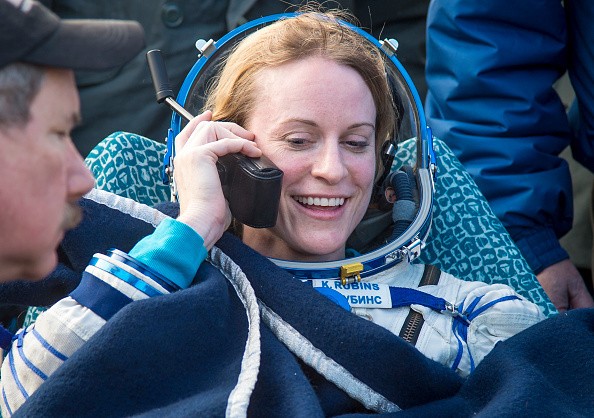US Election: NASA Astronaut Votes Early From Space Station
National Aeronautics and Space Administration (NASA) astronaut Kate Rubins has accomplished her civic duty to vote even while she's aboard the International Space Station (ISS).

Through a secure electronic ballot using a makeshift voting booth on the ISS, Rubins was able to cast her vote from space on October 23.
Rubins told the Associated Press before her launch earlier this month that it is vital for everyone to vote. If she can do it from space, Rubins noted that others could also do it from the ground.
From the International Space Station: I voted today
— Kate Rubins pic.twitter.com/DRdjwSzXwy — NASA Astronauts (@NASA_Astronauts) October 22, 2020
According to The Hill, it is legal for astronauts, who are Texas residents, to vote from space. Rubins and several other astronauts live in the vicinity of the Johnson Space Center in Houston.
A 1997 Texas law gives astronauts authority to cast their vote during "spaceflight," which will be forwarded from Mission control to the county clerk's space station.
Rubins, who was selected by NASA in 2009, completed her first spaceflight on Expedition 48/49 and became the first person to sequence DNA in space. However, she was not the first NASA astronaut to vote from space. In fact, several other astronauts did the same for the election in 2016.
"It's critical to participate in our democracy. We consider it an honor to be able to vote from space," Rubins told AP.
First American to Vote From Space
David Wolf, a retired NASA astronaut, was the first who voted in a local Texas election in 1997 while he was over 200 miles above the Earth. Wolf was on the Russian space station Mir when he voted.
Wolf can no longer recall what was on the ballot that year. But he remembered how deeply moved he was after he cast his vote, according to a The Atlantic report.
Wolf became the first American who voted from space because of a Texas' legislation that was signed into law that same year. The process for voting from the orbit remains the same even after more than 20 years.
An encrypted email from the Mission control with an absentee ballot from the inside will be sent to astronauts. Astronauts will have to fill it out and send it back to Earth.
A county clerk will receive the file and will be the one to write the selections on a ballot paper. Only the astronaut and the clerk will know the former's vote.
Voting from space emerged after John Blaha, who launched on the Shuttle to Mir in September 1996, failed to vote in a presidential election. He missed out on voting between Bill Clinton and Bob Dole.
When former Texas State Senator Mike Jackson heard about it, he went to NASA and told them that he wanted to introduce a bill that would allow more people to vote, particularly men from space.
In 1989, Jackson won his election by seven votes out of 26,000, and eventually, legislators in both parties quickly signed on to his proposed bill.
Check these out:
Subscribe to Latin Post!
Sign up for our free newsletter for the Latest coverage!
© 2025 Latin Post. All rights reserved. Do not reproduce without permission.















